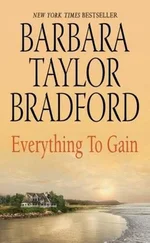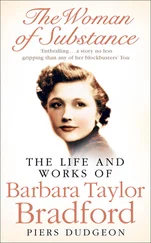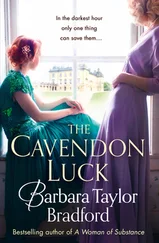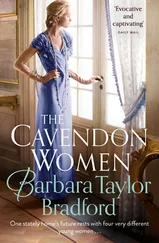Winston cleared his throat and said in his gentlest voice, ‘Well, he does a bit more than that. The Squire, I mean. He moved Frank into the mill offices and he’s being trained as a clerk. And every Sunday Aunt Lily goes up to the Hall and Cook gives her a basket of food. Enough for the whole week. For her and Frank. You see, Aunt Lily moved in here, Emma, to look after Frank. She gave up her cottage when Dad died. She’s gone up to the Hall now, Emma, to get the food. It helps a lot.’
‘A basket of food,’ she repeated scathingly, and laughed nastily. ‘Well, well, well. The Squire is being generous.’ She swung her head sharply and glowered at Frank. ‘I’m surprised you don’t choke on it, our Frank. I know I would!’
She turned on her heels and walked across the room, her head held high. Frank and Winston gazed at her stiff back and they exchanged worried glances. She put on her coat and took the flowers from the sink. She paused in the doorway and looked around. ‘I’m going to the cemetery,’ she said, her voice steely. ‘And then I shall go up to the Top of the World. I doubt there’s any heather there at this time of year, but I shall look. Anyway, I want to be by myself for a bit. I’ll be back later, and we can talk some more. Make some plans for Frank’s future. I’d like to see Aunty Lily as well.’
‘I’ll come with you,’ said Winston. ‘We’ll both come, won’t we, Frank?’ The younger boy nodded his acquiescence.
‘No!’ exclaimed Emma. ‘I told you I want to be alone. To think for a while.’
She closed the door softly behind her, before they had a chance to protest. She walked slowly up Top Fold, her feet dragging, a feeling of exhaustion swamping her. She headed for the small graveyard next to the church, aware of nothing except her overwhelming grief. Her face tightened and darkened, and there was a chilly light in her eyes as she looked ahead unwaveringly. And then her consummate hatred for the Fairleys, so close to the surface, rose up again and took hold of her, jostling against the grief for prominence in her mind. Was there no end to the pain that family would cause her? Was she to be cursed with them all the days of her life? Damn the Fairleys. All of them. Damn them! Damn them! Damn them! May they rot in hell!
And so it began: the most relentless pursuit of money ever embarked upon, the most grinding and merciless work schedule ever conceived and willingly undertaken by a seventeen-year-old girl.
By day, Emma worked at the mill; at night, after a hastily eaten light tea, she retreated to her bedroom at Laura’s and designed and cut and sewed clothes for a rapidly increasing clientele, local women informed by the devoted Laura of her flair with a needle, and her reasonable prices.
On Sundays, Emma baked fruit pies, bacon-and-egg pies, meat pies, and all manner of fancy pastries and cakes; she cooked mousses, jellies, custards, and trifles, using Olivia Wainright’s recipes, catering for parties and special occasions for the neighbours and, before long, the local gentry. When she was not engaged in her culinary endeavours for her growing number of customers, she bottled fresh fruits and vegetables; pickled onions, red cabbage, and walnuts; made chutneys and relishes and jams, which were painstakingly labelled and dated in her meticulous script, supplies being hoarded in Laura’s cellar to be sold later in her shop. Emma scrupulously lived on the weekly wage she earned at the mill as a weaver, and every penny she made from her dressmaking and catering was poured back into ‘the business’, as she called it, to purchase the necessary sewing materials and foodstuffs.
This worried Laura, but Emma pointed out, ‘You’ve got to spend money to make money,’ and she refused to listen to warnings about ‘getting in over your head’. However, it was not long before Emma began to show a small profit, much to her satisfaction, and Laura’s great relief.
Emma was dogged, ruthless with herself, scraping, saving, and working seven days a week and seven nights as well. She had no time to lose now. Her first goal-the first shop. And after that, more shops until she had a chain of shops just as Michael Marks had a chain of Penny Bazaars. But hers would be elegant stores which would cater to the carriage trade. That was where the real money was, where great quantities of money could be made by an astute retailer. To get that first shop Emma herself needed money. Money for the rent. Money for the fixtures and fittings and display stands. Money to purchase the stocks. Somehow she had to get that money and she determined that nothing and nobody would stop her. Emma had no doubts about her ultimate success. ‘Failure’ and ‘defeat’ were words now entirely erased from her vocabulary, for her belief in herself was absolute, and she knew, also, that she had one essential and most vital characteristic-an enormous capacity for work.
For a whole year, after she had learned of her father’s death, Emma took no time off whatsoever, except to visit Edwina one day every month. She regretted she did not have time to go to Ripon more often, as she had promised Freda, but she assuaged her terrible feelings of guilt and worry by reminding herself she was working for Edwina’s future.
Emma made only one trip to Fairley to see Frank during this time, and that was when Winston was home on leave again. They had decided, she and her elder brother, on that devastating April Sunday, that Frank should remain in Fairley with their Aunt Lily. It seemed to them both to be the best solution. He would continue to work in the mill offices until he was fifteen. At that time, they agreed, Frank could determine for himself whether or not he wished to pursue a writing career. If he did, Emma and Winston would somehow find a way for him to do this; perhaps working in Leeds, as a copy boy on one of the newspapers, learning the journalistic profession and attending night school; or perhaps they would have enough money between them to send him away to school.
‘Frank has been given a brain, Winston. A marvellous brain. And he has a talent for words. It’s a gift, really. It must not be wasted,’ Emma had proclaimed. ‘We must give him every chance, no matter what.’ Winston had nodded his concurrence. Emma had also made another decision that afternoon. She had informed Winston, and in no uncertain terms, that he must send Frank writing materials on a continuing basis. ‘Even if you have to forgo a few pints and cigarettes,’ she had ordered. She herself would undertake to supply Frank with a good dictionary and other books of her choice. He ought to be exposed to literature, such as the plays of Shakespeare, the novels of Dickens, Trollope, and Thackeray, philosophical works and histories. Victor Kallinski knew all about books and he would help her to select the most appropriate ones. Frank had been given his orders, too. He must study diligently, reading every night and in all of his free time, in order to further his education on his own. Aunt Lily was instructed to enforce this programme.
‘There will be no shirking, Frank, since Winston and I are making a special effort for you,’ Emma had warned in her sternest tone. Frank had been only too delighted to accept her offer, and he was not at all appalled by the rigid timetable she had worked out for him. He could not wait for the first books to arrive and he knew, too, that he would not change his mind about writing.
Emma had told Winston, Frank, and her Aunt Lily, only partial truths when she had given them her address in Armley. She had explained that she called herself Mrs Harte, and had invented a husband in the navy, simply as protection against unwanted and bothersome young men who might otherwise come courting. Winston had smiled at this ruse. He had actually congratulated her on her sense of self-preservation and told her she was being practical. Emma did not breathe a word about Edwina.
Читать дальше
Конец ознакомительного отрывка
Купить книгу












